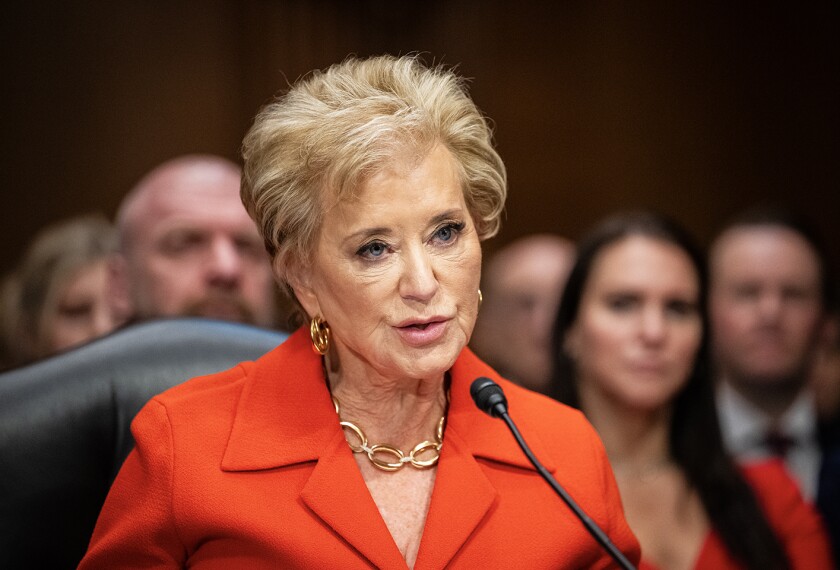What does a shift in rules for fair housing practices say about the Biden administration’s approach to controversial education issues?
Moves by the U.S. Department of Housing and Urban Development to bring back Obama administration rules provides insight into how the Biden administration will likely approach key K-12 issues, including guidance about racial disparities in school discipline. It’s also connected to broader debates about segregation in education.
And the move underscores how little certainty teachers as well as state and local education officials have about the federal policy and regulatory front beyond a few years.
Here’s the backstory: In 2013, the Obama administration introduced a rule under the Fair Housing Act that effectively made it easier for plaintiffs to seek legal redress for discriminatory housing practices, regardless of whether the intent of certain practices was intentionally discriminatory. This focuses on the “disparate impact” of policies on different groups, regardless of the motivation behind them.
In 2020, the Trump administration finalized its own rule about disparate impact in housing policy that departed significantly from the 2013 rule by shifting more of the legal burden back onto plaintiffs. (A judge’s subsequent ruling blocked the Trump rule from taking effect.)
That shift came amid former President Donald Trump’s big push to win suburban voters, who he said would be harmed by then-candidate Joe Biden’s support for high-density housing.
As we reported last year, Trump’s rhetoric that Biden would destroy the “Suburban Lifestyle Dream” was met with outrage from those who said his rhetoric was rooted in race and class prejudices that damaged education for students of color. Alongside that sentiment was skepticism that some who declared opposition to Trump’s position would support greater racial integration in their own neighborhoods and schools.
Now the Biden administration has proposed bringing back the 2013 Obama rule. “Facially neutral practices that have an unjustified discriminatory effect on the basis of a protected characteristic, regardless of intent, violate the [Fair Housing Act],” the Department of House and Urban Development wrote last last month in background material explaining its move to recodify the rule from eight years ago.
Biden’s Secretary of Housing and Urban Development Marcia Fudge, by the way, was a champion of school integration policies when she served as an Democratic congresswoman from Ohio.
A separate Obama-era housing rule from 2015 is also making a comeback under Biden, although there the situation is less straightforward.
That 2015 rule required state and local governments to demonstrate how their policies were complying with HUD rules meant to break down residential barriers to fair housing access, among other information, in order to receive certain Housing and Urban Development grants. As one analysis put it, the rule did not mandate any outcomes or require governments to “amend their zoning laws or build affordable housing” or take other actions.
You likely won’t be surprised to read at this point that the Trump administration suspended and then scrapped Obama’s 2015 rule. “We found it to be unworkable and ultimately a waste of time for localities to comply with, too often resulting in funds being steered away from communities that need them most,” Ben Carson, Trump’s HUD Secretary, said in 2020 when he announced his decision to terminate the 2015 rule.
Although the Biden administration announced an interim final rule last month reviving Obama’s 2015 policy, the Washington Post noted that Biden’s rule would remove the Obama-era requirement for governments to submit plans to HUD explaining how they would address residential segregation.
Policy pendulums swing back and forth as schools watch and react
In housing, of course, racial discrimination has a long and ugly history with lasting consequences for the segregation of American schools. To the extent federal policy can affect housing, there are obviously downstream effects on the demographic makeup of schools that experts say are tied to patterns in K-12 funding and other issues. But there’s also a connection to other education policy decisions from the Biden administration.
The focus on “disparate impact” was at the heart of the Obama Education Department’s guidance intended to address racial disparities in school discipline policies, irrespective of any demonstrable bias or prejudice on the part of educators. It’s become one of the most contentious issues in education civil rights circles.
Following the Trump administration’s 2018 school safety report from the administration spurred by the school shootings in Parkland, Fla., that called for an end to that guidance, Trump’s Secretary of Education Betsy DeVos rescinded it.
In early June, the Biden administration said it will revisit the issue of racial equity in school discipline. That could be a prelude to a revival of the Obama discipline guidance, something Biden pledged to do during his 2020 presidential campaign, although what precise form any such comeback would take remains to be seen.
Separately, the Biden administration announced in June that LGBTQ students are protected by federal anti-discrimination law, an issue where Trump took the opposite view.
“As numerous courts have recognized, a school’s policy or actions that treat gay, lesbian, or transgender students differently from other students may cause harm,” Biden’s Education Department notice said explaining its interpretation of the law.
Biden officials have also started a review of federal protections from sex discrimination for students. That review could lead to the reversal of a Trump administration rule finalized last year governing how schools must address sexual misconduct under Title IX.
As one expert on Title IX enforcement put it in an recent Education Week interview, school officials are “sort of a little punch drunk in a way” from how political shifts inside the Beltway have affected their work.
Many federal agencies beyond the Education Department and HUD have significant influence on K-12 education in ways that often don’t attract tons of attention.








